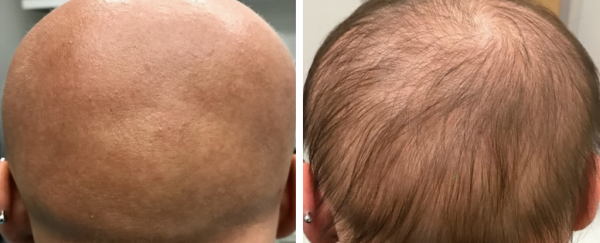A new eczema drug had an unexpected and significant impact on hair re-growth in a teenager with long-standing alopecia totalis - a condition with complete loss of hair on the head.
The physicians on the case are still unsure why, but if this effect can be replicated in other people, it could provide a much-need treatment for an autoimmune disorder with no known cure.
"We were quite surprised since this patient hadn't grown scalp hair since the age of two, and other treatments that can help with hair loss did not in her case," says senior author Maryanna Makredes Senna, a physician at Massachusetts General Hospital (MGH).
"As far as we know, this is the first report of hair regrowth with dupilumab in a patient with any degree of alopecia areata."
From Valium to Viagra, some of the best drugs that we have on the market today were stumbled upon by pure accident. Initially devised as a treatment for one thing, their scope of treatment was blown wide open by a stroke of serendipity.
This case study shows we might be onto something yet again. Dupilumab was recently approved by the FDA for the treatment of moderate to severe eczema, also known as atopic dermatitis.
Atopic dermatitis is also an autoimmune disease, but instead of the immune system attacking its own healthy hair follicles, it causes an allergic reaction on the skin, causing red and itchy rashes.
Previous studies have shown that these two autoimmune disorders are related and that those with eczema are more likely to develop alopecia than typically expected.
But even though these are comorbid disorders, a drug used for one may not help the other.
The thirteen-year-old patient in the recent case study knows all about this. Ever since she was seven months of age, the patient has undergone extensive treatment for her overactive immune system. Despite years of trying, nothing has had the desired effect.
While a couple of drugs in the past were able to somewhat relieve the patient's resistant eczema, which developed first, they had zero effect on her alopecia, which came about a few years later.
Where multiple other drugs have failed, it appears that dupilumb has succeeded.
Within six weeks of her first weekly injections, the patient's eczema symptoms were improved and she began to notice a scattering of fine hairs on her scalp, as seen in the image below.

After seven months, those fine and fair hairs, called vellus hairs, were joined by a wave of pigmented hairs, which are usually found on the scalp.
Dupilumab appears to be the cause of this unexpected growth; when a change of insurance forced the patient to take a brief hiatus from the drug, the newly grown hair fell out.
But after resuming treatment, her hair is growing back once again.

While the case is certainly exciting, far more testing needs to be done before it can be touted as a new treatment for alopecia.
"Right now, it's hard to know whether dupilumab could induce hair growth in other alopecia patients, but I suspect it may be helpful in patients with extensive active eczema and active alopecia areata," says Senna.
"We've submitted a proposal for a clinical trial using dupilumab in this patient population and hope to be able to investigate it further in the near future."
The study has been published in JAMA Dermatology.
